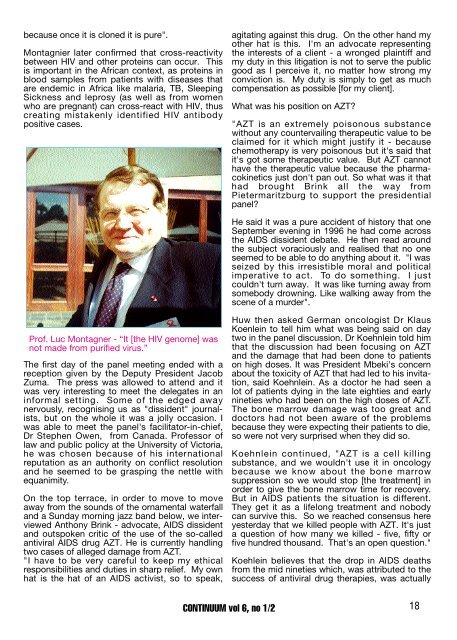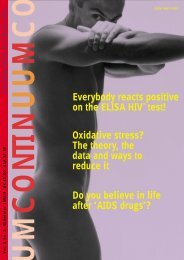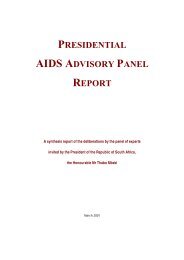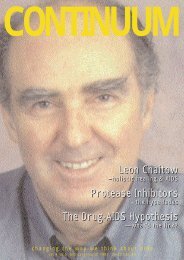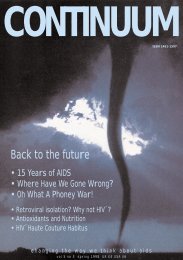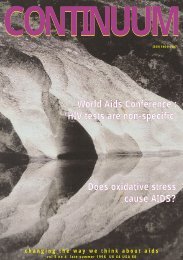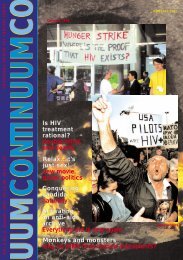AIDS post-HIV : beat of a different drummer - AltHeal
AIDS post-HIV : beat of a different drummer - AltHeal
AIDS post-HIV : beat of a different drummer - AltHeal
Create successful ePaper yourself
Turn your PDF publications into a flip-book with our unique Google optimized e-Paper software.
ecause once it is cloned it is pure".<br />
Montagnier later confirmed that cro s s - re a c t i v i t y<br />
between <strong>HIV</strong> and other proteins can occur. This<br />
is important in the African context, as proteins in<br />
blood samples from patients with diseases that<br />
a re endemic in Africa like malaria, TB, Sleeping<br />
Sickness and leprosy (as well as from women<br />
who are pregnant) can cross-react with <strong>HIV</strong>, thus<br />
c reating mistakenly identified <strong>HIV</strong> antibody<br />
positive cases.<br />
agitating against this drug. On the other hand my<br />
other hat is this. I'm an advocate re p re s e n t i n g<br />
the interests <strong>of</strong> a client - a wronged plaintiff and<br />
my duty in this litigation is not to serve the public<br />
good as I perceive it, no matter how strong my<br />
conviction is. My duty is simply to get as much<br />
compensation as possible [for my client].<br />
What was his position on AZT<br />
"AZT is an extremely poisonous substance<br />
without any countervailing therapeutic value to be<br />
claimed for it which might justify it - because<br />
chemotherapy is very poisonous but it's said that<br />
it's got some therapeutic value. But AZT cannot<br />
have the therapeutic value because the pharmacokinetics<br />
just don't pan out. So what was it that<br />
had brought Brink all the way fro m<br />
P i e t e r m a r i t z b u rg to support the pre s i d e n t i a l<br />
panel<br />
He said it was a pure accident <strong>of</strong> history that one<br />
September evening in 1996 he had come across<br />
the <strong>AIDS</strong> dissident debate. He then read around<br />
the subject voraciously and realised that no one<br />
seemed to be able to do anything about it. "I was<br />
seized by this irresistible moral and political<br />
imperative to act. To do something. I just<br />
couldn't turn away. It was like turning away from<br />
somebody drowning. Like walking away from the<br />
scene <strong>of</strong> a murder".<br />
Pr<strong>of</strong>. Luc Montagner - “It [the <strong>HIV</strong> genome] was<br />
not made from purified virus.”<br />
The first day <strong>of</strong> the panel meeting ended with a<br />
reception given by the Deputy President Jacob<br />
Zuma. The press was allowed to attend and it<br />
was very interesting to meet the delegates in an<br />
informal setting. Some <strong>of</strong> the edged away<br />
n e r v o u s l y, recognising us as "dissident" journ a l-<br />
ists, but on the whole it was a jolly occasion. I<br />
was able to meet the panel's facilitator- i n - c h i e f ,<br />
Dr Stephen Owen, from Canada. Pr<strong>of</strong>essor <strong>of</strong><br />
law and public policy at the University <strong>of</strong> Victoria,<br />
he was chosen because <strong>of</strong> his intern a t i o n a l<br />
reputation as an authority on conflict re s o l u t i o n<br />
and he seemed to be grasping the nettle with<br />
equanimity.<br />
On the top terrace, in order to move to move<br />
away from the sounds <strong>of</strong> the ornamental waterfall<br />
and a Sunday morning jazz band below, we interviewed<br />
Anthony Brink - advocate, <strong>AIDS</strong> dissident<br />
and outspoken critic <strong>of</strong> the use <strong>of</strong> the so-called<br />
antiviral <strong>AIDS</strong> drug AZT. He is currently handling<br />
two cases <strong>of</strong> alleged damage from AZT.<br />
"I have to be very careful to keep my ethical<br />
responsibilities and duties in sharp relief. My own<br />
hat is the hat <strong>of</strong> an <strong>AIDS</strong> activist, so to speak,<br />
Huw then asked German oncologist Dr Klaus<br />
Koenlein to tell him what was being said on day<br />
two in the panel discussion. Dr Koehnlein told him<br />
that the discussion had been focusing on AZT<br />
and the damage that had been done to patients<br />
on high doses. It was President Mbeki's concern<br />
about the toxicity <strong>of</strong> AZT that had led to his invitation,<br />
said Koehnlein. As a doctor he had seen a<br />
lot <strong>of</strong> patients dying in the late eighties and early<br />
nineties who had been on the high doses <strong>of</strong> AZT.<br />
The bone marrow damage was too great and<br />
doctors had not been aware <strong>of</strong> the pro b l e m s<br />
because they were expecting their patients to die,<br />
so were not very surprised when they did so.<br />
Koehnlein continued, "AZT is a cell killing<br />
substance, and we wouldn't use it in oncology<br />
because we know about the bone marro w<br />
suppression so we would stop [the treatment] in<br />
order to give the bone marrow time for recovery.<br />
But in <strong>AIDS</strong> patients the situation is diff e re n t .<br />
They get it as a lifelong treatment and nobody<br />
can survive this. So we reached consensus here<br />
yesterday that we killed people with AZT. It's just<br />
a question <strong>of</strong> how many we killed - five, fifty or<br />
five hundred thousand. That's an open question."<br />
Koehlein believes that the drop in <strong>AIDS</strong> deaths<br />
from the mid nineties which, was attributed to the<br />
success <strong>of</strong> antiviral drug therapies, was actually<br />
CONTINUUM vol 6, no 1/2 18


